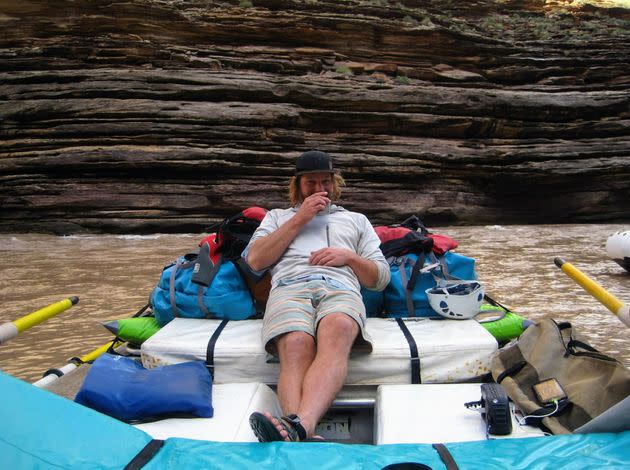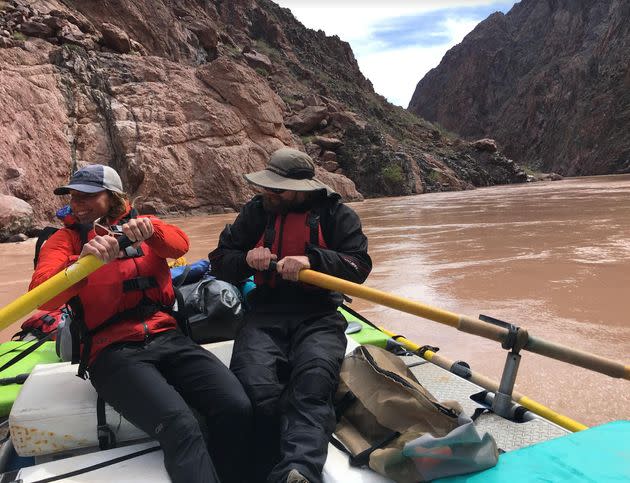I Spent 20 Days In A Raft With A Silent Stranger. I Never Expected The Twist Ending To Our Trip.

I met Doug on a 20-day rafting trip through the Grand Canyon, where I was randomly assigned to be the sole passenger in his boat. He was a former raft guide and bona fide waterman, soft-spoken and ruggedly handsome. I was a rafting novice who thought rain gear could stand in for a dry suit, and I’d signed on to the trip on a complete whim.
It sounds like the premise of a hit reality dating show, except that neither of us was cut out for reality television. If the cameras had been rolling, they would have had to add a lot of sound effects in postproduction. Like crickets. Or maybe that “womp womp” sad trombone noise.
I’m an introvert, shy around strangers and not very good at small talk, and Doug is quiet around everyone, so the first day in our shared raft was awkward. He asked me what I did for work, where I went to school and where I grew up, and I repeated the questions back. We talked about our hobbies (mine was climbing, his was surfing) and how we’d ended up on this particular trip. But the conversation didn’t flow, and after a bit of chatting we fell back into silence.
Every once in a while he’d identify a teachable moment to explain some intricacy of rafting: how to spot and catch an eddy, how to choose the best line or how to pick a ferry angle. Mostly we just sat quietly and watched the canyon walls float by.
Over the next few days, the grandeur of one of Earth’s largest holes in the ground gave us plenty to look at, but the long, silent stretches made me nervous. The limits of my social skills became painfully obvious when entire days would pass without me being able to come up with a single interesting conversation topic. Doug’s reticence certainly wasn’t helping. But I felt sure that if anyone else were in my shoes, they’d be able to crack his shell, or at least to come up with something more interesting to talk about than which flavor of Pringles we preferred.
When I looked at the other rafts on our trip, it seemed like everyone else was deep in conversation, laughing or goofing around, and I wondered if Doug wished he had someone more exciting sharing his boat. Sometimes someone else from our group would come hang out on our raft for a couple of hours, and they’d always comment on how peaceful it was. I couldn’t help but wonder if by “peaceful” they really meant “boring.”
“This is what you guys do all day?” one visitor asked. We nodded.

Each evening, our five rafts would convene on the shore to make camp, and I always felt relieved to reunite with the others. I’m a group person, better at joining conversations than carrying them, so spending time with 12 others took the pressure off. It felt easier to be myself in the evenings, cracking jokes that people actually laughed at and leaning into my competitive side in whatever silly game we’d come up with to pass the time.
One evening, an old acquaintance cracked up at one of my one-liners and said, “I never realized how funny you are!” I felt validated by his comment, but also frustrated. Why did I sometimes feel like I had two personalities? In a group on the shore I was goofy and worry-free, but alone in a boat with another introvert I was plagued by debilitating shyness.
I watched Doug interact with the rest of the group and saw that he was just as quiet with them as he was with me. He seemed content in his quietness, and self-assured, but I wondered if he ever felt insecure about it like I did.
I could have switched to another boat at any time, but despite the awkwardness, I returned to Doug’s boat day after day. He was one of the best boaters on the trip, and I trusted him not to flip our raft in the raging rapids. So it was partially self-preservation that motivated me to stay, but I was also drawn to the challenge. Could I push past our incompatible personalities to build some kind of real friendship with this silent man? Would we ever establish enough rapport for me to figure out what secrets he hid under his scruffy, gross beard?
As we descended deeper into the canyon, the quiet hours began to feel more comfortable. We fell into an easy rhythm, and our intricate code of nonverbal communication became a running joke.
Doug would pour himself a cup of tea from his thermos, and when he was done he would refill the cup and pass it to me without a word. When I reapplied sunscreen I’d hold it up to him in offering, and if it was zinc he’d nod his head yes, but if it was spray-on he’d shake his head no. Sometimes he’d offer me the oars but I had no idea what I was doing, so he’d direct me with intermittent, concise commands, jumping in to grab them just before I rammed us into a rock.
Once in a while, one of us would break our unspoken pact of quietude to scream “Sheep!” loud enough for all the other boats to hear, gesturing wildly to point out an illusive bighorn scrambling along the steep canyon walls.
The most words Doug ever said to me in a day came during a long, flat stretch of river where he pulled out a ukulele and serenaded me with an album-length concert while I lay across the bench seat with my eyes closed. The last song was an inspiring rendition of “I Don’t Want To Live on the Moon” by Ernie from “Sesame Street,” complete with a mouth trumpet solo. He was singing other people’s words, but I felt like I was finally starting to get to know him.
It took almost two weeks of eight-hour days alone in a boat in the bottom of the Grand Canyon before I started to sense something more than a quiet friendship blooming between us. When I realized that I had developed a crush on the stoic captain of our rubber raft, I told myself it was just part of the experience — that every novice rafter was bound to develop a crush on the person keeping them alive and ferrying them safely to camp each evening.
The interesting thing about it, though, was that even as we grew more comfortable together, we didn’t grow more talkative. There was no sudden shift where the walls fell down and we realized we had so much to talk about, so much to share. Things felt easy between us, but still I was getting to know Doug based almost purely on experience. He was showing me who he was rather than telling me.

By the time the trip ended, I was completely smitten but I hadn’t told him, afraid of breaking the spell of our quiet connection. When we finally kissed a few days later we were still acting mostly on nonverbal cues. But when I dropped him off at his house, he grinned and said, “We should keep hanging out.”
We spent a lot of time together in the weeks that followed. We talked some, but mostly when we were together we were doing things: going for bike rides, hiking or playing tennis during the day, and then cooking, playing cards or reading books aloud to each other at night. At the beginning I wondered if the spark would fade when we ran out of things to talk about entirely, but it’s been more than four years and it hasn’t happened yet.
It’s funny to think that if I’d met Doug at a party, or even on a two-day trip instead of a three-week one, I’m certain we would have written each other off immediately. If we’d met on a dating app or been set up by friends I probably would have gone back to those friends and told them how awkward it had been — how we’d had nothing to talk about and we just hadn’t clicked. But instead we spent all day sitting together quietly for three weeks, and the bond we formed in that boat has grown into the healthiest, strongest relationship I’ve ever known.
I’m not necessarily suggesting that everyone should go through 200 hours of awkward silence with a first date before writing them off as a bad match. But maybe we put too much importance on that initial spark, or we tend to equate that spark with words and how easily they flow from the get-go. Neither of us turned out to be much like the people we thought we’d met during that first day on the Colorado River, and I’m glad we had the time to realize it.
A few weeks ago, Doug and I were walking down Main Street on our way to the local household goods store. Doug had insisted that I accompany him on his hunt for the perfect medium-sized pot. He wanted stainless steel and rounded sides, with a long, metal handle and a strainer built into the glass lid. I was humoring his particularity regarding kitchen instruments, and as we walked to the store I prattled on distractedly, working through some big idea that I hadn’t quite wrapped my head around yet. He turned to me, smiling, and said, “You know, sometimes you really talk a lot.”
Alison Kaplan is a writer from Bishop, California. She works as a climbing ranger in Yosemite National Park. Connect with her on Instagram: @ali_kap.
Do you have a compelling personal story you’d like to see published on HuffPost? Find out what we’re looking for here and send us a pitch at pitch@huffpost.com.

 Yahoo Lifestyle
Yahoo Lifestyle 